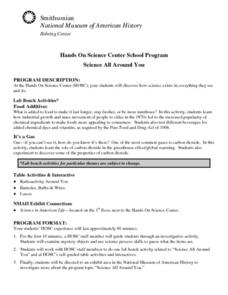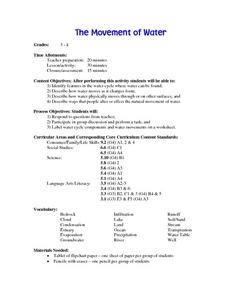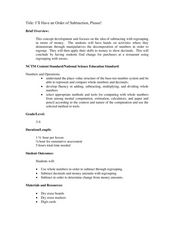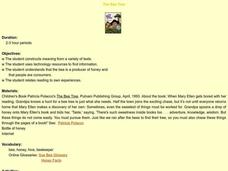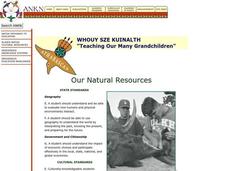Baylor College
Plant Parts You Eat
Plants provide a variety of delicious foods essential for human survival. In the fourth lesson of this series on food science, young scientists investigate common fruits, vegetables, and grains in order to determine which plant part is...
Purdue University
Eco-llapse
A balanced ecosystem doesn't mean balanced populations. Budding scientists complete a series of activities to learn about the relationship between producers and consumers in an ecosystem. They complete the wildlife conservation...
Baylor College
Food Webs
Explore various ecosystems from around the world as your class discovers the interdependence of all living things. Using the provided sets of ecosystem cards, young scientists work in small groups building food webs to demonstrate the...
National Park Service
Living & Non-Living Interactions
What better way to learn about ecosystems than by getting outside and observing them first hand? Accompanying a field trip to a local park or outdoor space, this series of collaborative activities engages children in learning about the...
Baylor College
Do Plants Need Light?
Turn your classroom into a greenhouse with a lesson on plant growth. First, investigate the different parts of seeds, identifying the seed coat, cotyledon, and embryo. Then plant the seeds and watch them grow! Measure the new plants...
Curated OER
Science All Around You
Learners visit and explore a Hands On Science Center (HOSC). They participate in a variety of self-guided table exercises and observe as scientists demonstrate various scientific principles.
Curated OER
Forest Ecosystem
Students become familiar with the temperate rainforest. In this forest ecosystem instructional activity, students identify the producers, consumers and decomposers in the forest ecosystem. Students sort cards and identify the trophic...
Purdue University
Mammal Food Webs
You are what you eat—or at least a part of what you eat. Budding scientists examine owl pellets to develop their own food webs. They use tooth and skull identification techniques to classify what they find.
University of Waikato
Build a Marine Food Web
Dive into a lesson on marine ecosystem interactions. Individuals learn about and devise a marine food web. The resource provides organism cards and pupils use article resources to discover interactions before modeling them in a food web.
Curated OER
An Introduction to the Ocean World
Students comprehend how the organisms that exist within the ocean biome, and categorizing each into producer, consumer, or decomposer. They place various human actions under the headings of "hazard" or "help," illustrating how humans can...
Curated OER
LEAF (Learning Exercises and Activities in the Forest
Students observe populations and determine the functions (e.g., decomposers, producers, consumers) they serve in an ecosystem. They investigate the energy flow ecosystems. Students investigate factors (.g., Resources, light, water) that...
Curated OER
Buggin' Out (Identifying and Adding Amounts of Money)
Learners explore consumer math by participating in estimate exercises. In this currency lesson, students identify and define each piece of U.S. currency and their value to the monetary system. Learners complete several money worksheets...
Curated OER
The Movement of Water
Here is an excellent lesson plan on the water cycle and the states in which water exists. Learners identify the features of the water cycle, describe how water changes form, and look at ways that people affect the natural movement of...
Baylor College
Serving Sizes
Are serving sizes for different foods always appropriate for what you need? In this hands-on activity, learners work in groups to estimate what one serving size of various foods are, and then evaluate their hypotheses by measuring real...
Curated OER
What's For Dinner?
Students explore the food chain. They brainstorm and create a consumer-consumed food chains using magazine pictures and research materials. Students identify consumer-consumed relationships.
Curated OER
I'll Have an Order of Subtraction Please!
Learners explore number values by completing consumer math worksheets. In this math functions lesson, students identify the use of a decimal in numbers and the place values that are represented when dealing with money. Learners complete...
Curated OER
Let's Start Growing
Students investigate how a tree grows from a seed. In this plant biology lesson plan, students use potting soil, tree seeds, and a paper cup to observe seeds growing into plants. Students record observations in their science journals.
Curated OER
Animal Life Cycles
Students participate in numerous activities to gather information about parts of the life cycle. In this life science lesson, the teacher choose from a number of activities to create or support an interdisciplinary unit about the life...
Curated OER
The Bee Tree
Students practice reading comprehension by reading a book in class. In this story map lesson, students read The Bee Tree by Patricia Polacco, and create a story map based on the problem and solution of the book. Students discover the...
Curated OER
Our Natural Resources
Pupils discuss key terms used to describe ecosystems and how humans are altering natural resources. They listen to the book, Grandfather's Wisdom, and list the renewable and nonrenewable resources they have used or consumed in the past...
Curated OER
Edible Plant Parts
Students participate in various activities to discover the six basic types of plants. In groups, they analzye the foods they eat and identify which part they consume. After reading "The Fablous Food Phantom", they create a food phantom...
NOAA
Seafood and Human Health
Whether your young biologists realize it or not, humans play a significant role in marine ecosystems. To help them understand this fact children first create graphical representations that show homo sapiens' place in marine food chains,...
Baylor College
Heart Rate and Exercise
Teach your exercise enthusiasts to read their pulse rate at the radial artery and multiply by four to calculate beats per minute. Learners perform a variety of activities, recording their heart rates after one minute of each. Though this...
Curated OER
Skulls Tell It All
Skulls tell it all, and with this lesson plan, you will tell it all to your class! Youngsters view animal skulls, analyzing the shape of teeth and the placement of the eye sockets. They associate these adaptations with the types of food...
Other popular searches
- Family and Consumer Sciences
- Family Consumer Science
- Consumer Science Foods
- Consumer Science Manners
- Health and Consumer Science
- Consumer Science Fibers
- Consumer Science Fibres
- Fm & Consumer Science
- Family & Consumer Sciences
- Consumer Science Fib Res
- Consumer Science Careers
- Food and Consumer Sciences







